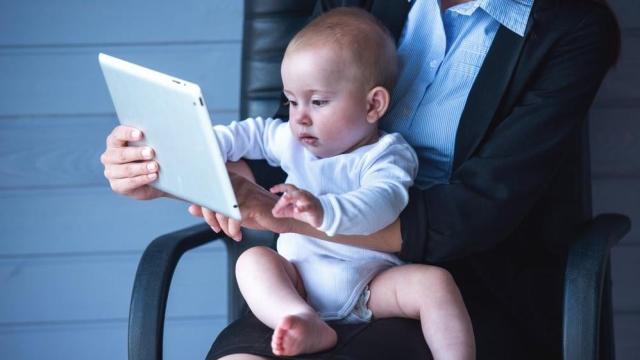Babies’ and toddlers’ access to more screen time could lead to developmental risks, according to a new study published in The Journal of the American Medical Association of Pediatrics (JAMA) on Monday. The study, conducted by researchers in Japan looked at the amount of time 7,097 children spent on tablets, phones, watching TV, or using other technology and how it related to their corresponding mental and physical abilities as they got older.
The children’s parents were asked in a questionnaire: “On a typical day, how many hours do you allow your children to watch TV, DVDs, video games, internet games (including mobile phones and tablets), etc?”
The study found that by two years old, babies who spent up to four hours per day in front of a screen were three times more likely to experience communication and problem-solving delays, while those who spent four or more hours on their devices were 5.78 times more likely to experience the same delays. They were also 1.74 times more likely to have underdeveloped fine motor skills and two times more likely to have not properly developed their personal and social skills.
The study reported that four-year-old children who had more screen time had developmental delays in communication, gross motor and fine motor skills, problem-solving skills, and personal and social skills.
“Kids learn how to talk if they’re encouraged to talk, and very often, if they’re just watching a screen, they’re not having an opportunity to practice talking,” Dr. John Hutton, associate professor of general and community pediatrics at Cincinnati Children’s Hospital Medical Center, who wasn’t involved in the study told CNN. “They may hear a lot of words, but they’re not practising saying a lot of words or having a lot of that back-and-forth interaction.”
The World Health Organization (WHO) advises against giving infants, defined as less than one year old, any kind of screen time and says two-year-olds should not be allowed more than an hour of screen time. “Achieving health for all means doing what is best for health right from the beginning of people’s lives,” WHO Director-General Dr. Tedros Adhanom Ghebreyesus said in the WHO news release. “Early childhood is a period of rapid development and a time when family lifestyle patterns can be adapted to boost health gains.”
Increased screen time can also affect the child’s ability to be bored, Hutton told CNN, adding that boredom breeds creativity and allows the child to pacify themselves, rather than becoming reliant on a screen.
“Longer term, one of the real goals is for kids just to be able to sit quietly in their own thoughts,” Hutton told the outlet. “When they’re allowed to be a little bit bored for a second, they get a little uncomfortable, but then they’re like, ‘OK, I want to make myself more comfortable.’ And that’s how creativity happens.”
A Unicef report said more screen time can also reduce a child’s ability to build empathy, saying: “For a brain to develop and grow, it needs essential stimuli from the outside world. More importantly, they need time to process those stimuli.” It added: “Exposure to screens reduces babies’ ability to read human emotion and control their frustration. … It also detracts from activities that help boost their brain power, like playing and interacting with other children.”
The JAMA study reported that only 4% of babies surveyed were exposed to more than four hours of screen time per day, while 18% had between two and four hours of screen time, while the majority said their child had less than two hours. They noted that the babies exposed to more screen time were children of younger first-time mothers who had lower household incomes, lower maternal education levels, and suffered from postpartum depression.
The researchers indicated that more follow-up studies will need to be conducted to verify their findings. They reported that it is possible the findings could be reverse causation, meaning the child already had a developmental delay which might have lengthened their screen time use.
